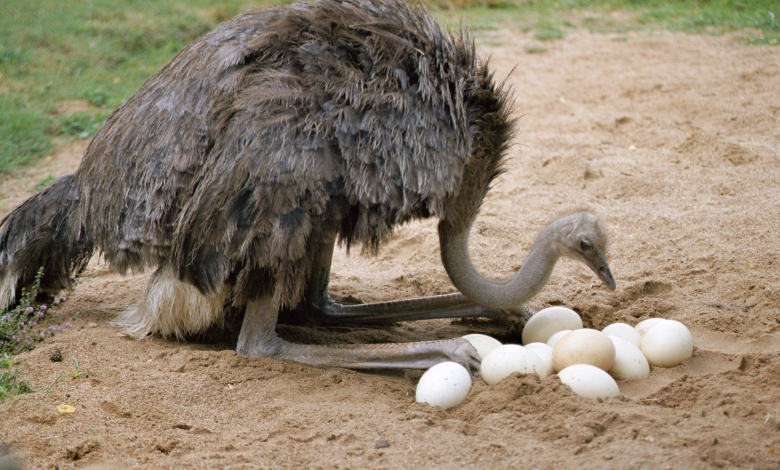Curious how much protein is in an ostrich egg? Discover its nutritional value, protein content, and how it compares to chicken eggs.
I remember the first time I saw an ostrich egg up close. It was massive, like holding a small bowling ball in my hands. The sheer size alone made me wonder: How much does this contribute to protein intake? And more importantly, how does it compare to our everyday chicken eggs? That curiosity sent me down a rabbit hole (or should I say, an ostrich nest?), uncovering some truly fascinating facts about the protein content and nutritional value of these giant eggs.
If you’re here, you’re probably wondering the same thing: How much protein does an ostrich egg provide for your protein intake? But beyond that, you might be looking for deeper insights, how does it fit into a high-protein diet? Is it worth considering as a protein source? Let’s crack this egg wide open (pun intended) and explore everything you need to know.
Article Breakdown
The Nutritional Breakdown of an Ostrich Egg
1. Protein Content: A Heavyweight Champion
An average ostrich egg weighs between 3 to 5 pounds (1.4 to 2.3 kg) and contains approximately 235 grams of protein. To put that into perspective, a large chicken egg has about 6-7 grams of protein. That means a single ostrich egg packs the protein equivalent of 24 to 28 chicken eggs.
For those of us focused on high-protein diets, whether for muscle building, weight loss, or general health, this is a game changer. Imagine whipping up an omelet that could feed an entire family while delivering a massive protein boost.
2. Beyond Protein: The Full Nutritional Spectrum
While protein often steals the spotlight, an ostrich egg offers much more:
- Calories: Approximately 2,000 calories, making it a calorie-dense option.
- Fat: Around 100 grams of fat, which may sound high but includes beneficial omega-3 fatty acids.
- Essential Nutrients: Rich in vitamin B12, riboflavin, folic acid, iron, magnesium, and omega-3s, all crucial for energy production, brain function, and overall well-being.
Why Consider an Ostrich Egg for Your Diet?
1. A Complete Protein Source
Ostrich eggs contain all essential amino acids, making them a complete protein source, ideal for muscle growth, recovery, and overall body maintenance. If you’ve been cycling through the usual suspects, chicken, beef, fish, this could be a fun way to diversify your protein intake.
2. Perfect for Large Gatherings or Meal Prepping
If you’re like me and enjoy meal prepping, an ostrich egg can be a bulk meal-prep dream. One egg can make several servings of scrambled eggs or a massive frittata that lasts for days.
3. Nutrient Density for Active Lifestyles
Athletes, bodybuilders, and those following keto or paleo diets will appreciate the high protein-to-calorie ratio and the presence of healthy fats that support energy levels and muscle maintenance.
The Challenges: Is It Practical?
Before you run off to buy an ostrich egg, there are some real-world considerations:
- Availability & Cost: Unlike chicken eggs, ostrich eggs aren’t sitting on your grocery store shelf. You’ll likely need to source them from a specialty farm or exotic food supplier. Prices vary but expect to pay $30-$50 per egg.
- Cooking Logistics: Ever tried cracking an ostrich egg? It’s not as simple as tapping it on a bowl. The shell is about 2-4mm thick, requiring a hammer, saw, or drill to open. Boiling one takes 45-90 minutes!
- Portion Control: One ostrich egg equals 24+ chicken eggs. If you’re cooking for one or two people, that’s a lot of eggs to eat before they go bad.
How to Cook an Ostrich Egg
If you’re up for the challenge, here are some ways to cook an ostrich egg:
1. Scrambled Ostrich Egg
- Crack it open using a small saw or hammer.
- Pour the egg into a large bowl.
- Whisk well, adding salt, pepper, and any seasonings.
- Cook on medium heat, stirring continuously. Expect a 15-20 minute cook time due to the volume.
2. Ostrich Egg Omelet
- Whisk the egg with veggies, cheese, and herbs.
- Pour into a large frying pan and cook on low heat.
- Serve it up as a family-sized omelet.
3. Boiled Ostrich Egg
- Place the egg in a large pot of water.
- Bring to a rolling boil and simmer for 45-90 minutes.
- Once cooked, use a hammer to crack open the shell and enjoy!
My Ostrich Egg Experiment
I had to try it myself. Finding one wasn’t easy, I ended up ordering from a local farm specializing in exotic eggs. It cost me $45 and took two weeks to arrive.
Opening it? A workout. I used a hammer and chisel (yes, really), and after several attempts, I finally managed to get inside. The yolk was huge, like a golden puddle of sunshine.
Cooking it felt like a science experiment. I scrambled half and stored the other half in the fridge. The texture was similar to chicken eggs but slightly fluffier. The taste? Mild, slightly buttery, and absolutely delicious.
Would I do it again? Absolutely, but only for a special occasion. It’s not an everyday protein source, but it’s an unforgettable experience.
Key Takings
- If you’re a protein enthusiast, an adventurous eater, or just someone who loves a good kitchen experiment, an ostrich egg is worth trying at least once.
- It’s not just a conversation starter, it’s a nutrient-dense, protein-packed powerhouse that can add variety to your diet.
- However, for everyday protein needs, chicken eggs are still the more practical choice. That said, if you ever get the chance to crack into an ostrich egg, don’t hesitate, it’s an experience you won’t forget.
Useful Articles:
- All About Ostrich Eggs (and What You Can Do With Them): This article explores the nutritional value, practicality, and unique aspects of cooking or eating ostrich eggs.
- I Bought an Ostrich Egg, and Here’s What I Made With It: A personal account of cooking with an ostrich egg, including its size, taste, and creative uses.
- Ostrich Egg For Food: Highlights the nutritional benefits of ostrich eggs, including their high protein content and essential vitamins.
- Why We Don’t Eat Ostrich Eggs (YouTube): A video discussing the challenges and reasons why ostrich eggs are not a common food choice.
- Why Don’t We Eat Ostrich Eggs When One Egg Can Be Enough for 12 People: Explains the health benefits of ostrich eggs, including lower cholesterol and their potential as a healthier alternative.
Disclaimer: While ostrich eggs are a great source of protein and nutrients, always consult with a healthcare professional before making significant changes to your diet.



